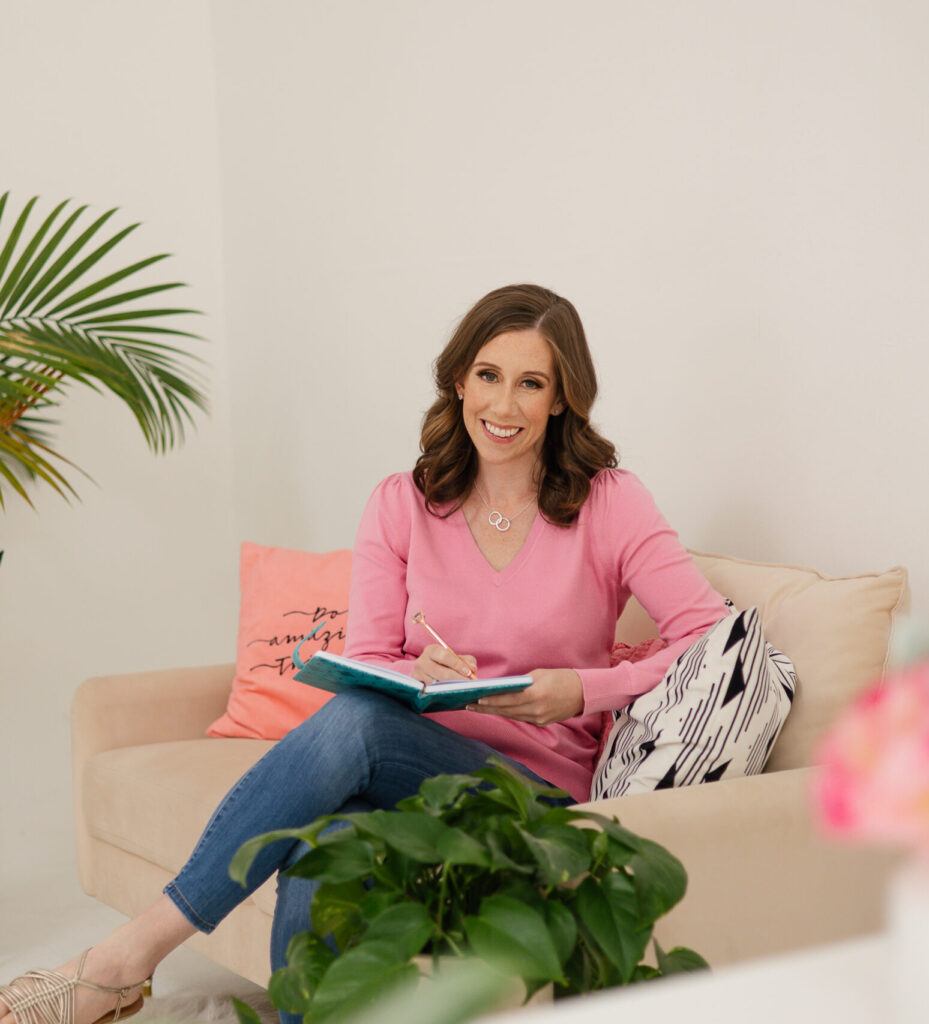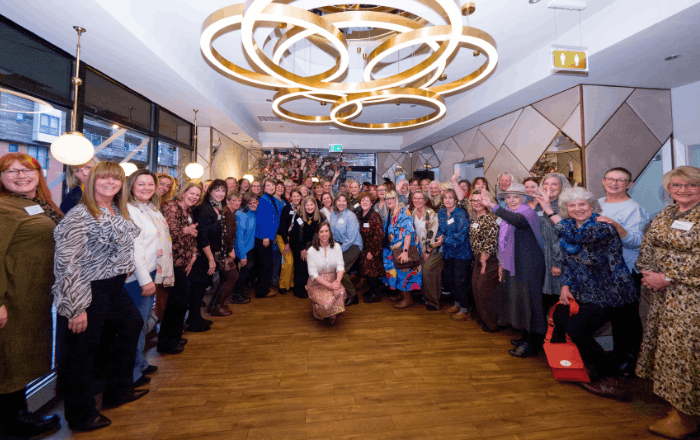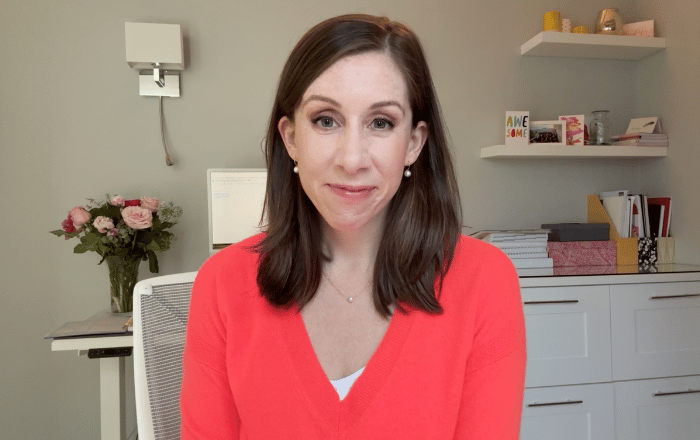“I am not going to drink this week.”
I used to make promises like this ALL the time. Sometimes I’d stick to my plan for a few days – and sometimes I’d change my mind within a few hours.
It was all too easy to give up on my sober goals and delay them until next week or next month 😕
Perhaps you can relate?
It was ages before I realised that I’d been forgetting to include something very, very important in the goal-setting process: ACCOUNTABILITY.
Why accountability works
When you have someone – or something – keeping you accountable to your goals, it can be incredibly powerful. You dramatically increase the odds of you staying committed and following through on your promises.
Studies have shown that when you share your goals with others, you’re twice as likely to achieve them than if you keep the goals to yourself.
It makes sense, right? When you’re being kept accountable, you can’t just quit when things get tough. You can’t dismiss your goals or pretend they never really existed. You have to figure things out and stay committed to them.
Before you start
Make sure you pick a clear and achievable sober goal. Big, vague goals rarely work and a ‘forever’ commitment can be terrifying. Deciding that you’re quitting for good is almost impossible to picture, so your brain starts wavering on the commitment and you feel overwhelmed.
Instead, I recommend making a firm commitment for a shorter period of time – somewhere between 40 and 100 days is ideal. Let your brain teach your brain that you ARE good at staying committed and sticking to your word.
How to add accountability
Feel free to try out some or all of the following:
 Sign a commitment contract
Sign a commitment contract
This is a binding agreement that you sign with yourself to ensure you follow through on your goals. Stickk.com is a website that allows you to set up a commitment contract and put some teeth behind it by adding a monetary value!
This means you have to hand over cash if you don’t follow through. You decide in advance where the money goes to – just imagine how motivating it would be to pick a person or organisation that you really don’t want to give any money to!
 Ask someone to keep you accountable
Ask someone to keep you accountable
This can be really powerful if you pick the right person – it needs to be someone you trust and respect. One of the women on my stop drinking course asked her best friend to check in with her on a daily basis, so she had an extra layer of accountability in early sobriety.
Every morning, her friend would text to ask, “did you stick to your alcohol-free plan yesterday?” My client knew she’d never lie to her friend and she couldn’t stand the idea of having to reply with a ‘no’. It turned out to be a really strong deterrent!
 Stay accountable to a group
Stay accountable to a group
I’d strongly recommend seeking out some kind of support group. This doesn’t have to be face to face – online communities are also incredibly motivating. My stop drinking course is a group coaching programme for this very reason.
When you’re working on a goal at exactly the same time as everyone else, you feel accountable to the group. And if you’re struggling, being able to reach out to other people who get it – but are ploughing on regardless – is very inspiring.
 Use a habit tracker
Use a habit tracker
Apps like Sober Time or Productive will help you keep a day-by-day record of specific goals. There’s something strangely powerful about tracking your progress and seeing the days add up – you will not want to break a winning streak!
 Plan exciting rewards
Plan exciting rewards
Staying accountable isn’t just about avoiding negative consequences – positive reinforcement is a great method for staying accountable as well.
I’m a big believer in splurging on sober treats, because when you stop drinking, you free up some serious time and cash. So, go on – treat yourself. Don’t just celebrate the big goal – honour the smaller milestones along the way as well.
How do you stay committed?
Leave a comment below and let us know how you’ve kept yourself accountable to your alcohol-free goals, or if you have any tips to share! 🙂




30 responses
Thanks for these great ideas! I love the idea of putting some money at stake – that would definitely make me think twice. Something else that’s helped me take things more seriously is writing a list about why I’m doing this. I think you talked about this on another blog Kate. Writing it down in my journal really helped me focus on why I need to do this.
Writing down all your reasons why can be really powerful, especially when you go into detail. It’s much harder to ignore this stuff when it’s written down in black in white. Keep going Liv 🙂
Going to begin writing today!
I have been working on achieving optimal health for the last 2 year’s. My chiropractor recommended no alcohol except special occasions. So at first cut way back. During these 2 years I watched my mom exist on kidney dialysis(not from drinking) and this confirmed I didn’t want to end up like that. Right now I have 30 days. Had 1 drink at a rodeo 30 days ago and before that had 17 days going without. After consuming some type of alcohol every day for the last 35 year’s or more it wasn’t easy. But finally can say don’t desire any at all.
Hi Vicki
I was so happy to rea d your comment.. my problem of course is desire as I am sure is true for most. I have been drinking for many many years and I have recently quit for a month but still had the desire. I don t really have any major issues but I am just tired of thinking about booze. There is really no reason to drink. I wish I could ge to the point of no desire. I know people who have quit for years and still think about wanting a drink. This is what makes me feel like it’s useless to try.
Hi Deb – generally speaking, the people who’ve quit for years and STILL miss drinking are people who’ve quit via AA, or some other method that relies solely on willpower. It makes me sad to see these people suffering, all these years later. I’d strongly encourage you to take a look at my coaching programme, where we do things a little differently. Once you’re clear on the myths about alcohol – and you work through my system for changing your mindset and seeing alcohol for what it really is – it’s a lot easier to quit. I always say to my clients, if sobriety was hard, or I felt as if I was permanently missing out, then I wouldn’t be bothering with it (or recommending it to other people!). Alcohol free living is meant to be fun, not miserable. Here are some more details about my course: https://thesoberschool.com/course/
thanks Kate for the quick response..Yes, I do know willpower alone does not work. I wonder thou is willpower the same as “making up your mind”? I feel that is part of my problem. I am not fully committed to the idea of not drinking. If I was, I think I would be able to make it work. I am not physically addicted. For me it is just a habit. Thanks for all your work and effort into helping others!
Keep a log for the first year . It’s a fascinating record. Not just zero drinks but what stressed you, what was easy, unexpected benefits, new goals, struggles. I had a mantra- I can’t eat or drink an emotion- still use it many years in and my relationship with food is much better too
I love this – it must be a great record to look back on! And that mantra is brilliant 🙂
The online me group continues to keep me accountable. I enjoy contributing and hopefully encouraging the newer members. In the beginning I told my grand children and children and they were very helpful. Sometimes they were the AP( alcohol police) they would carefully inspect my AF beer to be sure it was really AF .
Mary – you are a real inspiration to the newer members of our group and I always appreciate your posts!
Shortly after I decided to go sober, one of my closest friends was diagnosed with cancer. I decided and told our friendship group that since she couldn’t drink I would keep her company by staying sober too. I don’t always find it easy, but there’s no greater incentive, as what she’s going through far outstrips any uncomfortable craving I might have from time to time. It definitely helps to have a sober friend on social occasions where typically most people are drinking.
That’s certainly a powerful reason for doing this – I’m sure your friend appreciates your support 🙂
I told all my Facebook friends that I was an alcoholic and had my final drink on that day. Once I knew I was committed to staying sober I announced I would never drink again. That accountability (even though I know people probably aren’t that bothered apart from my closest friends and family) has kept me going along with all the other benefits!
14 months sober now!
Congratulations on your 14 months Catherine! And good on you for being so open about it – a public declaration like that is a great way to stay accountable. Well done 🙂
I stay committed because of you Kate! Once I made the decision to quit drinking( I have tried so many times) I knew that this is it! I put off joining Kate’s Sober School……thought about it alot but just said No.
I knew the time was now!!!!! Its unbelievable it will be a month next weekend…..its funny because alot alot of times I would have a quitting date and then a month later I would tell myself HAD I QUIT DRINKING WHEN I SAID, I WOULD BE A MONTH SOBER! Then guilt and dissappointment set in! I always felt like a failure!
This has been the greatest thing I have ever done to have a GREAT LIFE and be present! It’s been hard at times don’t get me wrong but my toolbox helps and I don’t want to disappoint myself because at 61 years old I want to LIVE!
I just love this post! I’m so pleased you took the leap and joined the course Jenny. Here’s to many more amazing, alcohol-free days to come 🙂
Jennifer,
You have expressed my feelings exactly. Kate and this site have kept me company as I have, just recently started on this journey. Kate’s description of her experience resonated with me. I could go for months and not drink, then drink every single day for the rest of the year. I am exploring the site and getting to know the resources. I am feeling very hopeful.
Kate, you have inspired me to “ slow down “ my drinking big time! Your blog is brilliant. I was justifying the 2-3 bottles of wine I drank per week , sometimes more, in all sorts of ways, now I have only had about 5 glasses of wine in 2 months! – I have to have the strength to keep it up. I actually enjoy the feeling on not drinking!
That’s great to hear! Don’t forget to the mindset work too – willpower will only get you so far. I recommended some books in my last blog that you might like to take a look at. Or check out my course for more support: https://thesoberschool.com/course/
Wow I’m taking that first step to stop drinking. I’ve been divorced 2 years and my drinking has escalated to a very dangerous level. You words of advice here I’m going to use. Thank u so much.
Hi Caroline, I too have committed to staying sober. I just want to be present in my everyday life. All the best with your journey 🙂
Good luck Caroline. Taking a break from drinking is a great place to start. If you need any coaching and support to help make your alcohol free goals happen, my online course might be right up your street: https://thesoberschool.com/course/
My drinking started after a divorce as well. I was raising 4 little kids and had no support. I’m not sure how the drinking started, but 20 years later I was still doing it. I finally made up my mind to quit and discovered Kate and wine o’clock. I knew she understood and joined the course. It has been a life saver , literally. The myth busting has been a God send.
Hi Kate.
You were my inspiration. I related to the woman in the videos and everything you said made sense. I am 5 weeks and 3 days sober. I had to consciously think of the numbers of weeks and days just then as I don’t count anymore. It’s as if I’ve never drank and I don’t miss it one bit, thank you for all your help.
Regards
Kate
Congratulations on your 5 weeks Kate! That’s fantastic. Wishing you many more happy, hangover free days ahead 🙂
How are you succeeding? I try and try and fail, fail, fail. How do you go forward? What clicks to do day 2, week 2, more?
Hi Michelle, if you’d like some help to stop drinking and make things click, I’d be happy to help you with this. The best way for us to work together is via my online course. Here are the details: https://thesoberschool.com/course/
.hi Michelle,
I can not even count how many times Ive tried, but I Will never give up, this time Will be different, due to Kate and hope and signing up for the course, never give up, it shows how strong you are and not weak xxxx
Hi Kate and lovely sober ladies,
I have been looking for inspiration and support for some time. I have tried AA and it wasn’t for me either. I actually entered a residential rehabilitation centre at one stage in my life, for 18 months! That kept me sober for three years but I truly believe that it did more harm than good. After that experience I learned ways to ‘manage my drinking’; treating it as though I was ‘taking my medication’. I am 55 yrs old and really want to start LIVING. I used to tell myself that I don’t get hangovers, and I didn’t particularly notice them, because I don’t really have a lot of experience with feeling well! To me a hangover has become a fairly normal state and I only struggle with the 2 bottle ones. Or so I tell myself. I have realised, in my desire to quit, that drinking daily is like having a disability. I have just written down all the things I would like to do at night, and could, if I didn’t drink. The list is extensive. The only thing keeping me from enjoying this beautiful life is the belief that I can’t change. I am very fortunate. I live in a beautiful place in the world, where eight million tourists a year descend, and I haven’t experienced all of it because of my sorry beliefs about my drinking. I have a beautiful partner who does wonderful things like run me a bath at the end of the day and who loves and nurtures me and doesn’t drink. I have a delightful family and extended family and it has recently occurred to me how heartbreaking it would be for me if one of them consumed alcohol the way I do. It is like a disability that I elect to have; I don’t want it and I can change it.